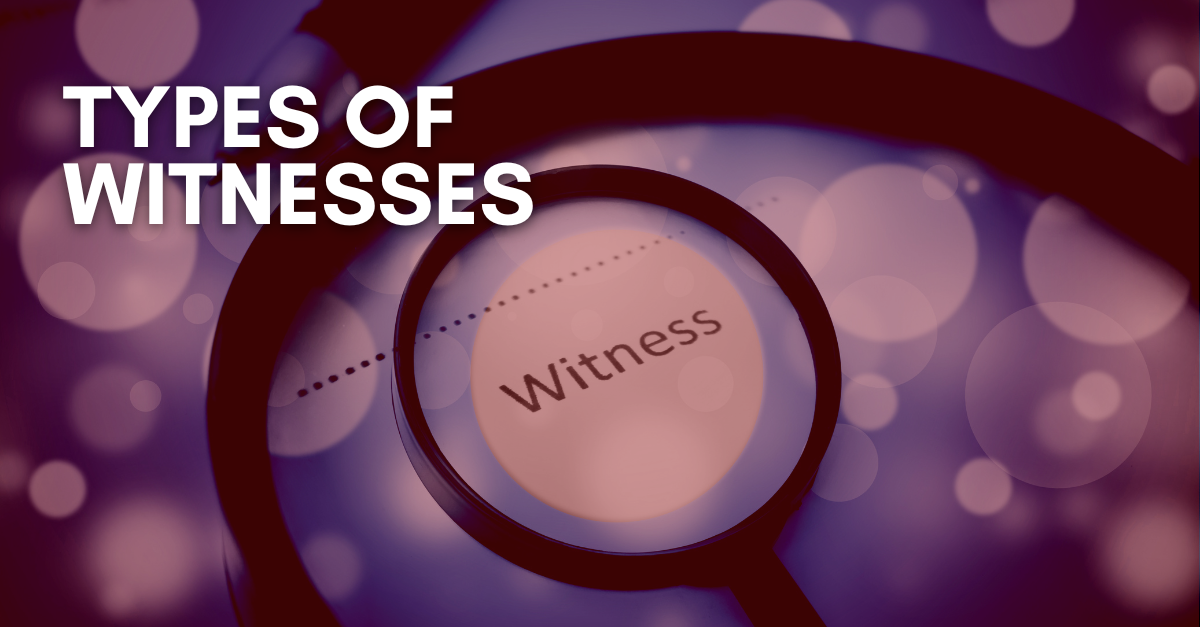It’s part of any private investigator’s skillset to work with different types of witnesses. Mainly due to the fact that they can play a pivotal role in most cases. So in today’s article, we will be outlining the most commonly seen witnesses.
There are quite a few different types of witnesses in cases:
- Expert witnesses
- Eyewitnesses
- Character witnesses
- Fact witnesses
- Lay witnesses
Then among witnesses (usually eyewitnesses), you can have two types:
- Primary
- Secondary witnesses
A primary witness is someone who has witnessed something, relevant to court, taking place firsthand. Whereas a secondary witness simply repeats something they heard from another person. Secondary witnesses may come in to corroborate or cross-examine a primary witness. A neighbor, for example, may have overheard a conversation relevant to the case. Or they may have talked to someone who saw the event take place.
What are the differences between the types of witnesses?

Different types of witnesses hold different roles in court and during a case.
- Expert witness: Someone who has expertise in a given area that is brought in to elucidate on a particular piece of evidence relevant to their specialty. For instance, bringing in a musician, knowledgeable in music theory, to give an analysis that may reveal whether a piece of music was stolen from another artist and/or if it breaches copyright.
- Eyewitness: This is fairly self-explanatory. An eyewitness could be anyone who saw or heard an event take place relevant to the case at hand. They witnessed something take place and can offer their perspective on it.
- Character witness: A character witness is someone who can testify on behalf of another individual. This is to determine whether a given individual has certain positive or negative personality traits. This may be used to confirm motivations during a case, for instance.
- Fact witness: A fact witness is the other side of the coin from an expert witness. Where an expert witness uses their knowledge to give an opinion about a piece of evidence. A fact witness is someone who gives testimony on facts concerning the case, usually reciting.
- Lay witness: This consists of any witness testifying without any qualified knowledge in the area they are testifying for. However, they must still limit themselves to giving testimony on subjects they are knowledgeable about.
How reliable are witnesses?

How reliable a witness is depends very much on what kind of witness they are and on the circumstances. An eyewitness, for example, is not completely 100% reliable. They may not always be completely accurate, and people’s memories are not perfect. Not to mention, that the circumstances of the event they witnessed may have an effect on their perception of it, since nerves or fear may have affected them. This would color their recount of it and they may remember it differently from how it actually happened.
This does not mean they are not reliable though, simply that they cannot be solely relied on to build a strong case. Fact witnesses on the other hand are very reliable. Their responsibility is simply to relay the facts present at court and present these to the relevant individuals at hand. For instance, relaying the facts to an expert witness to give their opinion on a specific piece of evidence.
This brings us to expert witnesses. Their testimony although very useful, cannot be solely relied upon either. Since they are giving an opinion and interpreting a piece of evidence. An opinion is not fact, and there can be many ways to interpret a given piece of evidence.
If you find yourself in need of a licensed private investigator and their particular set of skills, please feel free to call us. Or simply click on this link to get in contact with one of our team members.










